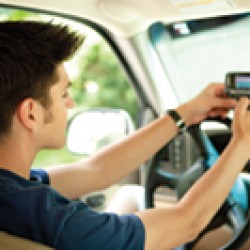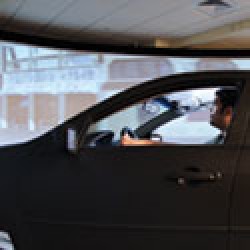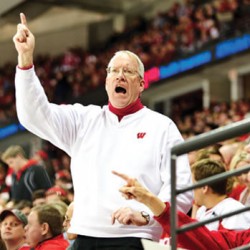Mark Riccobono ’99: Pioneer for the Blind

Mark Riccobono, center, works with two students in one of the National Federation of the Blind’s STEM (science, technology, engineering, and math) programs. Courtesy of National Federation of the Blind.
When Mark Riccobono ’99 slid into the driver’s seat at Daytona International Speedway in 2011, he was fulfilling the childhood dream of many people — with one astonishing distinction: Riccobono is legally blind.
“We endeavored to build a car that a blind person could drive,” says Riccobono, who spearheaded the National Federation of the Blind’s (NFB) Blind Driver Challenge® initiative by finding a university to build nonvisual technology that purposely left room for independent thought and driver error. In other words, this was no autopilot Google Car. “I was selected to represent [NFB] to demonstrate that blind people, if given the right information, could do something that most people believe is impossible,” he says.
Just three years later, in July 2014, Riccobono was elected president of NFB, which he describes as “the oldest, largest grassroots, most dynamic organization of blind people in the world.” Riccobono has also served as founder and president of the Wisconsin Association of Blind Students at UW–Madison, president of the Wisconsin chapter of NFB, and executive director of the Maryland-based Jernigan Institute, the first and only institute for blindness run by the blind. For Riccobono, who was diagnosed with a degenerative eye condition that left him legally blind at five years old, his UW–Madison experience served as an awakening.
“I started to really understand that I had internalized society’s low expectations for blind people and that I was sort of following the path you were supposed to follow, rather than pursuing what my dreams were, because I didn’t know that I could pursue my dreams,” says Riccobono, who received WAA’s Forward under 40 Award in 2011. “So I got students together at the university; we created a student association; and we started sharing our tools and techniques. We started working together to advocate for better services.”
Back then as today, those advocacy goals include harnessing new technology to increase access (such as a goal to make the newly scanned UW library collection equally accessible to the blind); advocating for policy change (a loophole in the 1938 Fair Labor Standards Act makes it legal to deny minimum wage to those with disabilities even today); and challenging the public’s perception of blind people, which is generally sympathetic but skewed, breathtakingly limited, and unintentionally dismissive of the potential contributions that an entire segment of the population could offer.
“The University of Wisconsin is a tremendously diverse place. I think when you can open yourself to that environment, it gives you a perspective about the tremendous human resource we have in this world and the value that comes out of our diverse perspectives and sharing with each other,” says Riccobono, who knows he’s now in a stronger position than ever to effect critical change. “One way to look at it is, blind people have more opportunities and access than ever before. But there’s still a lot of progress needed to truly have the type of lives that we want, to have the equality in society where we are respected and seen as people who have capacity.”
Published in the Winter 2014 issue



Comments
No comments posted yet.